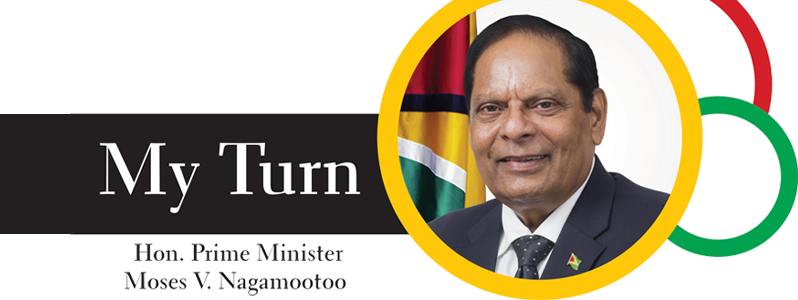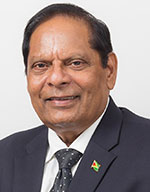IT is expected that President David Granger will shortly name a new Commission to help the continuing effort at restoring integrity in public life.
The law provides for the Integrity Commission to comprise a chairperson and not more than four other commissioners, and as Prime Minister with responsibility for Governance, I was requested to recommend persons who qualify to serve.
The persons serving as commissioners themselves are expected to be of good standing and are required to declare their assets to the President.
UNENVIABLE STIGMA
Over the past 10 years, Guyana has carried the unenviable stigma of being ranked the second lowest in the Caribbean on the corruption perception index. For a greater part of that period, Guyana had no Integrity Commission. Since 2009 the Commission was without a Chairman, and by 2012 the Commission had lapsed.
The Integrity Commission Act came into effect on 24th September, 1997, but it took another two years before the Commission started its work under the chairmanship of Bishop Randolph George, now deceased. It operated out of an office located at State House.
During November, 1999, I made the first declaration of all my assets and income, and that of my wife. I did so, regularly and consistently, until 2014 when I inquired from the Secretary of the Commission whether a new commission had been appointed. The response was in the negative, which I read into the records of the National Assembly whilst I exposed the notorious fact that our Integrity Commission was both headless and non-functional.
CONFIDENTIAL INFORMATION
As there was no Integrity Commission, I didn’t feel obliged to volunteer to a non-existent body, confidential information, such as I had declared under oath over the previous 15 years. I had started to see how income tax declarations of selected persons were discriminatorily and unlawfully being leaked and otherwise massaged in public. Politicians and public servants had confided that “we in dis together” in the frenzy to damage anyone then perceived to be a dissident.
No wonder that requirements to declare to the Integrity Commission were ignored by other persons in public life, who might have felt no compulsion to do so, with ample justification, and in the absence of a Commission.
The office of the Integrity Commission was shifted to the National Trust building. Later the records were removed and stored in a room at the office of the Ethnic Relations Commission, which was at one time under the leadership of Bishop Juan Edghill. There was only a skeleton staff, substantively a single person. That could have raised questions as regards the integrity of the declarations.
PHANTOM COMMISSION
Today, I am amused that the good Bishop, who had since served as a Government Minister and, now, a Member of Parliament of the People’s Progressive Party (PPP) is threatening private criminal proceedings against persons in public life who have not made declaration of their incomes and assets to the phantom commission.
Rather than accepting responsibility for strangling the Integrity Commission when in government, the Opposition PPP is resorting to a politically simulated, feigned “holier-than-thou” posture. Last year it had tried, just tried, similar political antics in the National Assembly when it tabled a motion that required all MPs to make public their income tax declarations for a period of 10 years before they took office.
The subtle sting in that mischievous motion is that it was intended to catch MPs other than those who were not required to submit or pay income taxes. Those persons included Messrs Bharrat Jagdeo and Anil Nandlall who, as President and Attorney General respectively, had enjoyed tax-free incomes. As proponent of the motion, Mr. Jagdeo was not required to pay income tax, as he had chosen to take his pension, which is above one million monthly plus perks, instead of a parliamentary salary, which is less.
ETHNIC AND GENDER BALANCE
Trying to select persons who would qualify to be commissioners is no simple task. Selection has to taken into consideration not only the professional qualifications of the nominees, but ethnic and gender balance. Many persons who were approached expressed great interest in serving, but some didn’t like the idea of making declaration of their assets, especially those in business and professional private practice.
But the effort at restoring integrity in public life has to go on, and I am grateful to those who stepped forward to do duty for their country. Yet, I suspect that the critics, cynics and oppositionists would take a swing at the commissioners and would try to besmirch their characters.
This is Guyana’s politics at its vintage, one would say dismissively. It is the politics of negativity, of throwing cold water on everything worthwhile, including oil.
I heard the other day the Finance Minister saying that one oil company would be investing US$4 billion in the Guyana oil industry, which will throw wide open the door of business opportunities by triggering demands for local services. The investment excludes the 2% royalty and a 50:50 profit share payable to Guyana. Yet, the Opposition Leader is adamant that Guyana would be “worse off” when oil production kicks in.
Similarly, when I shared with the Leader of the Opposition the draft Code of Conduct for Persons in Public Life, he was quickly but intemperately moved to deem it “crap”. Though he refused to submit any proposals, I took scraps and pieces from his public pronouncements and tempered and improved sections of the Code which has since been gazetted for inclusion in the Integrity Commission law.
Our Government re-affirms its commitment to strengthening the quality of public office in Guyana. For this we need not only relevant codes and laws, but a reconstituted Integrity Commission to whom persons in public life should declare their assets and incomes, and which should monitor conduct of office-holders to ensure that they do not benefit from disproportionate wealth, or gain personal advantage and advancement from such office.
INSTITUTIONAL LANDSCAPE
Our Coalition Government has taken bold steps to change the institutional landscape that had once bred pervasive corruption. There is a concerted campaign on all fronts to:-
* establish relevant commissions and to professionalise the public service;
* vet intake and to weed-out recruits into the law-enforcement agencies who are found to be corrupt;
* establish a Procurement Commission and introduce procurement procedures that are fair to all;
* recover stolen state assets through civil proceedings;
* actively counter illicit narcotics, money-laundering, piracy, smuggling and contraband activities; and
* uphold the Rule of Law through robust defence of the doctrine of Separation of Powers.
We are climbing slowly, but surely up the ladder of respect as a clean and decent democracy, a cornerstone of which is the restoration of integrity in public life.












